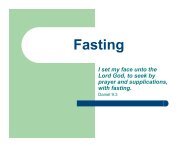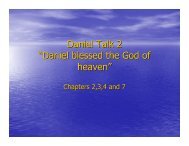Handout - Western Christadelphian Bible School
Handout - Western Christadelphian Bible School
Handout - Western Christadelphian Bible School
Create successful ePaper yourself
Turn your PDF publications into a flip-book with our unique Google optimized e-Paper software.
(a) Describes the last time that Israel will be invaded by a blasphemous conqueror<br />
(vss 10, 11) who, in this case, desecrates a Jewish temple, removes the daily<br />
sacrifice because of transgression (vss 12, 13) and suppresses the worship of God<br />
(vs 12).<br />
(b) Note that this is certainly an end-time prophecy, in spite of Antiochus’ historic<br />
model: Dan 8:17, 19, 23. See, also, Session 3 – Multiple Applications.<br />
(c) The last days will begin with a simultaneous invasion of Israel, subjugation of<br />
God's people and desecration of a Jewish temple (Matt. 24:15, 21; Dan. 11:31,<br />
12:1, Joel 1:9, 13, 16, Psalm 79:1ff).<br />
(d) The whole process, from the placing of the abomination of desolation and<br />
suppression of the “host” of Israel (vss 13, 24) until the cleansing of the<br />
sanctuary is to take 2300 days (vss 13, 14).<br />
(e) These days are certainly literal:<br />
(i) They refer to a period during which the daily sacrifice is suppressed -<br />
Daniel 8:11, 26; 9:27; 11:31; 12:11.<br />
(ii) The usual Hebrew word for “day” is “yom” (used 2008 times in the OT).<br />
Basically it means “day” as opposed to “night” (eg Gen 1:5); or a day of 24<br />
hours (eg Gen 7:17; cp Gen 7:12). Otherwise it has quite a range of special<br />
or idiomatic meanings such as an era - as in Zechariah 4:10 – “the day of<br />
small things”. So it is impossible to be certain about the exact meaning of<br />
“yom” in any given context. On its own, it might even be “a day for a<br />
year”. (However, we’ll soon see that it certainly cannot mean that in<br />
Daniel.)<br />
(iii) All of Daniel’s time prophecies use the word, “day”, “yom” – except for<br />
the one time prophecy that includes all the others – Daniel 8:14.<br />
(iv) The word translated “days” in Dan 8:14 is a contraction of two words<br />
meaning, respectively, “evening” and “morning”. The special word is<br />
“ereb-boqer”. This is the only place in the <strong>Bible</strong> where this contraction is<br />
found. It refers to 2300 evening-morning periods - or 6 average solar years<br />
and 108 days (Dan. 8:9-14).<br />
(v) “Ereb” occurs 137 times in all and means “evening”. It’s applied in many<br />
parts of the Old Testament in a very straight-forward way. What is of<br />
particular note in Daniel 8:14 (which is in a context of an interrupted daily<br />
sacrifice - Dan 8:11, 12, 13) is that “ereb” is the word used for “evening” in<br />
the law of the continual (daily) offering – Numbers 28:4, 8.<br />
(vi) Similarly, “boqer” (occurring 204 times) just means “morning” or<br />
“daybreak”. Again, one of its applications is to the morning component of<br />
the daily sacrifice – Numbers 28:4, 8.<br />
(vii) Thus it becomes absolutely certain that the 2300 days of Daniel 8:14 are<br />
days of 24 hours, for Daniel has chosen a way of specifying the time unit<br />
that leaves no doubt that the period is an interval of 2300 evening-morning<br />
(interrupted daily-sacrifice) cycles.<br />
The Last Days: A Beginning, An End, And Three Major Events Between<br />
6 This total period of 2300 "last" (24-hour) days has three intermediate, included<br />
intervals, for each of the 1260, 1290, 1335 and 2300 day intervals all begin from the<br />
same starting point – the desecration of a Jewish temple and the cutting off of the daily<br />
Page 56







